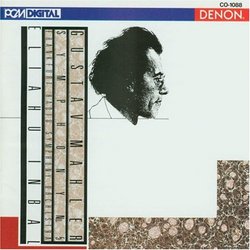| All Artists: Gustav Mahler, Eliahu Inbal, Frankfurt Radio Symphony Orchestra Title: Mahler: Symphony No .5 Members Wishing: 0 Total Copies: 0 Label: Denon Records Release Date: 8/30/1993 Genre: Classical Style: Symphonies Number of Discs: 1 SwapaCD Credits: 1 UPC: 081757108829 |
Search - Gustav Mahler, Eliahu Inbal, Frankfurt Radio Symphony Orchestra :: Mahler: Symphony No .5
 | Gustav Mahler, Eliahu Inbal, Frankfurt Radio Symphony Orchestra Mahler: Symphony No .5 Genre: Classical
Another excellent performance in what is one of the best complete Gustav Mahler cycles. Eliahu Inbal's performances have gotten somewhat lost in the shuffle, with so many new Mahler recordings coming out every year. Judg... more » |
Larger Image |
CD DetailsSynopsis
Amazon.com Another excellent performance in what is one of the best complete Gustav Mahler cycles. Eliahu Inbal's performances have gotten somewhat lost in the shuffle, with so many new Mahler recordings coming out every year. Judging from the competition, the Fifth seems to be one of the most difficult of the symphonies to conduct, and it's a measure of Inbal's identification with the composer that this is one of his most successful performances. The orchestra, brass in particular, really digs into the music, and Inbal paces both the tricky central Scherzo and the famous Adagietto just about perfectly. Denon's sound in this series consistently outclasses most of the competition. --David Hurwitz Similar CDs
Similarly Requested CDs |
CD ReviewsOne of the best 5th's! MasterG | Minneapolis, MN | 02/27/2000 (5 out of 5 stars) "Of the seven recordings I own of this work, Inbal's version is the best, surpassing even Bernstein and Karajan in my opinion. Inbal and his performers pay attention to the details and play with a ferver and intensity usually only found in live performance. It also has been recorded superbly, better than any recent releases I can think of. This should be an Amazon.com essential recording, not the Bernstien. By all means, go right ahead and buy this terrific rendition of Mahler's 5th. You will be very pleased indeed." This definitely can't be ignored Shota Hanai | Torrance, CA | 04/14/2004 (5 out of 5 stars) "Sure this isn't the Grammophone Bernstein (Overrated? Maybe) or Solti, but this recording definitely can't be ignored! Very fine trumpet solo in the beginning of the piece, very nice (and as Mahler liked, very free) tempi on both slow (the funeral march), and fast (the trumpet - the protagonist - desparately fighting against the storm of collapse and failure). The third movement is a bit slow and heavy compared to most recordings I've heard, but it's still very nice. The soothing fourth movement was excellent, and the remaining two sounded great as well. Like I said before, this recording can't be ignored. Period. Don't hesitante to buy the CD." Nice touches, but Inbal is too low-key by half Santa Fe Listener | Santa Fe, NM USA | 01/30/2010 (3 out of 5 stars) "Contrary to the loopy Amazon review, Inbal's Mahler cycle is far from "one of the best," but since this Mahler fifth is selling for so little on the used market, it's worth checking out. The big plus for Inbal has always been Denon's excellent, clear, natural sound. The Frankfurt orchestra can handle the score with considerable assurance, and even though they aren't the Vienna Phil., the deciding factor is interpretation. I recently read a professional critic who declared that the Fifth was Mahler's sunniest symphony, a bizarre contention on the face of it, yet the faster tempos taken by a much earlier generation would incline toward a less intense, doleful reading. Then there's the question of how intensely we are meant to feel Mahler's emotional swings and turmoil.
I'd say that Inbal falls about midway between the cool customers (Zinman, Chailly, Tilson Thomas) and the emotionally fiery (Bernstein, Shipway, Schwarz -- the latter two being obscure but riveting). The funeral march that begins the symphony isn't desolate in his hands, yet when he gets to the contrasting, turbulent section, there's a sense of grief released into semi-hysteria. None of this is optimistic music, and INbal's deliberate pacing keeps us in a sad world where the clouds break only occasionally to reveal the sun. I think it takes a great orchestra led by an excitable conductor to bring out the volcanic turmoil of the second movement, and here Inbal and the Frankfurt musicians fall short. They don't give the feeling that they can walk in a giant's boots. They bring this music down to earth and at times all but amble along. Mahler saw the Scherzo as an outburst of joy. Inbal doesn't catch on and tries to turn it into an updated minuet. His efforts to tame this movement are misguided. The famous Adagietto has varied so much in tempo and mood that one hardly knows if it is meant as a mournful elegy or a sweet paean to love. Inbal is slow and tender, capturing a bit of both approaches, his mood too relaxed for mourning. I find it an appealing reading, if quite low key. the finale is the puzzle piece of the whole symphony; one rarely hears a completely convincing account -- most make the music sound too negligible or bumptious. Inbal is simply neutral, as if no problem exists. In the end, this Fifth is representative of a skilled conductor who operates from real feeling but errs on the side of caution." |

 Track Listings (5) - Disc #1
Track Listings (5) - Disc #1



